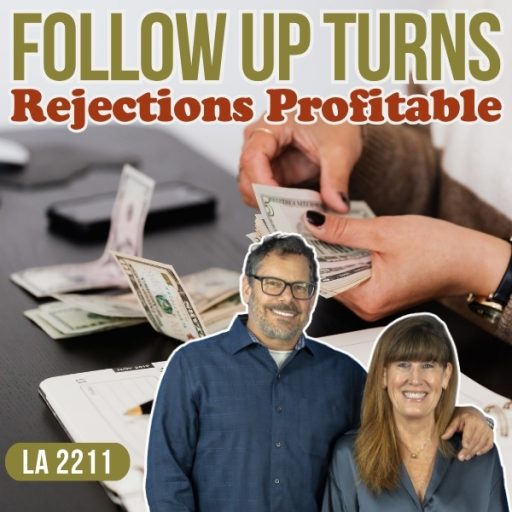This is episode number 2211. Jill and I are talking about why follow-up can turn rejected offers into land deals. I love this. This is a huge key part of our business. I don’t think we talk about it enough. That’s why I put this topic in here. I want to hear from Jill.
That’s funny. This is always been important/however, I’ll tell you in the sixteen years I’ve been a full-time land investor that now more than ever, it used to be easier if you will, because I don’t know, it just was a whole different environment back then, I would say. People didn’t have the tools, meaning the general public didn’t have ways to look up what their house was even worth back then. They didn’t know, and just this opportunity presented itself. It was so new and so unique when we would come at them and say, “I want to buy your property.” They’re like, “I didn’t know we could sell it this way.”
Correct. Jill, you got it.
It was really like I said, easy. I said, “Don’t worry about it, I got this.” My only job back then was them believing that I could do the process. Now I have to win them over. We’ll talk about that more when we get up to the show.
Wait, this week, it’s a pretty good advice week. Next week, we’re going to have amazing advice for you.
You’re such a stinker. I clearly didn’t write this. I have nothing to do with this.
Each day on the show, we answer a question from our Land Academy Member Discord Forum, and we take a deep dive into land-related topics at your request.
Neil wrote. “It’s part of my trolling/fishing exercise,” which, for those of you who are not sure what that is, that’s one of Jack’s real early steps. When you’re looking at places around the country, trying to figure out where would be a good place to send offers to buy property. Neil wrote, “As part of my exercise, I see on Zillow a healthy for sale to sold properties, which are less than 100% but when I pull up Realtor to research the data for the corresponding areas, like and even by zip codes, that for sale to sold value is above 100%. He said way above 100%.”
This is such a good question.
“I’m looking on Zillow, I go cross-check it and Realtor, now it throws my numbers off. I’m wondering, should I stop considering those zip codes as it does not seem to fit the Radial Green Test due to the higher for-sale-to-sold ratio/value in Realtor, despite Zillow showing it the other way.”
Understanding Data Sources (Zillow Vs. Realtor)
This is a fantastic question. You need to know where the source of data is coming from, always. Realtor.com is the national association of Realtors who have created and controls the MLS, the Multiple Listing Service. There are 344 separate individual MLSs all over the country, and they pay dues up to the National Association of Realtors, those small organizations.
When you become a real estate agent, you join the MLS, where you think you’re going to buy in solid real estate in one of those 344 places. If it’s 345, please don’t blow my inbox up. It’s some number close to 344. The Realtor.com requires everybody to put into the internet systems or software to roll up. There’s nothing like that that goes on with Zillow. Zillow is a startup company that started in Palo Alto.
I’m almost sure it started in Palo Alto, to be a competitor/information provider for another way for people to sell property, including real estate agents. Sometimes they feed into the MLS, and sometimes they don’t. There are considerable differences, huge differences between what goes on in Zillow and what goes on in Realtor.com. We use Zillow a lot because people who have vacant land tend to post it there, because it’s a great place for land.
It’s a really easy interface for us to see what’s active and sold. You can just split between the two screens to see. What I love about this is he’s questioning it. He’s questioning what the heck the difference is and what’s the deal. If you want to see what’s on the MLS, use Realtor.com. If you want to see where there’s a lot of for-sale property by owner and other sources of properties being listed, use Zillow.
We use Zillow for land. We use Realtor.com for houses, moving by, and sell houses. Redfin‘s somewhere in the middle. Redfin has contracts with each of the MLSs, and they’re good for urban areas and not so good for rural areas. Why? It’s because more activity, real estate activity, buying and selling, goes on in urban areas.
Do you know what’s funny about that, because we’re often like we’re doing houses, too. There’s no secret to that. Jack is often, we’ll be driving in areas and just throwing out numbers or looking at things again, comps. He’s rolling around with a realtor on his app, and I’ll throw out a property good, “What about this one?” He goes, “What are you talking about?” It’s because I’ll be on Zillow, and it’s not even on Realtor, and it’ll be a house. It’s very interesting.
Sometimes a good deal.
Exactly. He’s like, “Where did you get that? It’s not even on here.” I’m like, “Yeah.” Now you know where it comes from? The real question is, which one for Rovic Land should Neil pay the most attention to?
I would, in general, use Zillow. We have for years, but I love your check. I’ll check Redfin too if they’re servicing that area and look at them side by side. You’re clearly, Neil, a data person.
You’re taking it to the next level.
You’re concerned about why there are variances in these numbers. These are great, rational, common-sense questions, and that’s how millions of dollars are made in real estate just by saying, “This doesn’t make sense to me. I’ve got to get to the bottom of it.”
Don’t kick that zip it up to the curb yet.
The Strategic Importance Of Follow-Up In Closing Land Deals
Our topic Why Follow-up Can Turn Rejected Offers Into Land Deals?
As I was explaining earlier, even ten years ago, it wasn’t as prevalent now. We didn’t have people trying to for sale by owner do stuff. It was really still unheard of that people would say, “What do you mean I can sell a house by myself?” Yeah, you sure can. It could be a sibling buying somebody else’s house, whatever it is. You could go to the escrow company, and they do all the paperwork for you.
There was a lot of explaining that I had to do back then to let people know you could do that. It was a lot like, “You buy a car off Craigslist, yeah, it’s a car. You can do it with a house.” “What are you talking about?” Even before that, remember when the first thing that came out that eBay, remember people were like, “What do you mean I can buy a car off eBay?” You could buy a house off eBay. Now you can buy a golf course off eBay.
All kinds of things. It’s crazy now, all this stuff. It’s so accepted now, people get it. I don’t have to deal with that hurdle, I should say. Now, what’s going on in our world is that it’s so important is winning over sellers. That’s the whole point here. The topic is why follow-up can turn rejected offers into land deals. My thing is you’re going to have to spend more time on the phone nurturing sellers like you’ve never had to do before.
At this time, it’s not about what’s possible. It’s not about how this works. It’s not about any of that. Even your company has not even as questioned. It’s more about you as an individual. The best way that you can win over sellers and get great properties at great prices, still doing what we do, is you following up, being a real person, understanding their objections, overcoming their concerns and objections, and getting that deal done.
Follow-up is a big one. Nowadays, they’re not sitting around waiting for your phone call thing. You have to push these deals through. It’s like follow-up is the general term, but it’s really like babysitting. This is one of the things that we talk about often in our community. I’m like, “You need to, at the end of every single phone call, have the next step identified, scheduled with these sellers, and make sure you have the right phone number, how they want to be reached, whatever it is.”
For example, the call comes in, we calm them down, we talk money, we talk about the property, and they talk about me. We’re warming up. They’re like, “I’m ready. You’re real. I got that. We talked for twenty minutes.” Maybe it’s that, right? “I believe you.” You know their situation. I know the seller’s situation. I’m like, “Here’s a scoop.” We got the deal. I need to go make sure, I know we offered $13,000 and you want $20,000.
“I need a day to see if I can make $20,000 work. I’ve got to call the county. I’ve got a couple of things. I got to figure out. We’re going to get you tomorrow. I need all morning to work on this. We’re going to get you tomorrow, anytime after one. What’s better for you, and what’s the best number.” “Okay, Jill.”
“Here’s the thing. In the meantime, while I’m doing this, there are a couple of things too. Can you cross off the $13,000 and write in $20,000 on that purchase agreement and send it to me? I need that buy-in too from them that I’m trying to make that $20,000 work.” As Jack said, babysit, it’s almost pushing these through, and if I don’t get that from them and I’m not calling them back tomorrow when promised, it’s going to be harder to save this deal and harder to get this deal moving forward.
They have to be motivated to sell it to you. Usually, a hundred percent of the time, it’s because they’re having a life event and they need the money, or they need to get the house out of there, or the piece of land out of their lives. Here’s the thing. Since the internet, there’s been a huge shift in attitude for everybody. There’s a ton of information, and most recently, in the last twelve months, I’ve noticed there’s really disinformation.
There’s a lot more stuff for everyone, all of us to sift through and figure out if it’s real and it’s making us cynical. Here’s a great example. In the last 24 months, Jill and I have put in offers with real estate agents on property, land, and houses in various states where we believe stuff that’s listed on the MLS could work for us at a certain price. It’s never what they’re asking it’s usually in some cases it’s ten percent below.
In some cases, it’s more, in some cases it’s less. In every case where we came in that it was not within ten percent of the purchase price, we didn’t even get a response. That’s never happened, and that’s $16,000 deals that I’ve done that have never happened. We would engage the broker, at least the real estate agent or the broker would call us back, the listing agent, we would engage them, and start a conversation about why we want to buy it.
Here’s a justification, and there would be a back-and-forth discussion and usually a back-and-forth negotiation on the price, but none of those things happened. They figuratively stuck their middle finger up to us. I don’t believe that it was personal. I don’t believe it was any of that. They just didn’t want to. They couldn’t be bothered.
It’s weird.
There’s so much cynicism in this industry. My point is when Jill says she’s following up in an engaging in the seller, there’s no real estate agent involved in these land deals like the way we do it, then the deal is going to get done. Just by the fact that she’s calling them back, engaging them, and saying, “Please sign it. If the price works for you, if it doesn’t, we’ll talk about that. Let’s have half hour conversation about it and see how we can get this deal done for you if you want it to be done. After all, we are writing a check here.”
That’s the point. There’s a point where you’re right. Some of these deals, I’m like, they don’t want to sell. They clearly don’t want to sell. That’s fine. That’s a whole other talent and a whole other discussion that we will talk about because that’s that takes a little bit of experience to pick up on. It’s not you.
You don’t seem to, as a society, engage with each other anymore. We seem to just criticize whatever the other person is saying. I don’t think it’s industry-specific or generation-specific. I think it’s the Internet. It’s just everyone’s got a knee-jerk, fast troll-type opinion about whatever anyone says. Even nice stuff.
I’m going to wrap it up for me on this topic, which is this. The bottom line is if you push, you have to push the deal through all the way to closing, not in escrow, to closing, done, deed recorded.
I agree.
That’s still follow up as far as I’m concerned, making sure it’s going. That’s how you’re going to get these deals done. It’s a rejection, the whole thing is, you guys are talking about it’s not a rejected offer yet. We weren’t on the same page about price, but we got to the same page, and we got to a number that works. I have to push it and not let it be rejected. I have to make an accepted offer and keep it an accepted offer by staying in contact twice a week, at least, maybe sometimes more.
Push is not a word I would use. I mean, it’s fine for you. You can use whatever word you want. What I see when I hear you’re doing these deals throughout the office is engagement. I just think you and some people need to be over-engaged or hand-held or pushy, as it makes me think of an auto dealership. It’s not a hard sale.
No, I’m not pushing. I’m like I’m pushing the deal through, not pushing on the phone.
It’s just some people need more engagement.
I’ve got to be what’s the word I’m looking at? Just own it proactive. There we go. That’s a good one. That’s good.
Join us tomorrow, where Jill and I discuss building a land investing business that survives any market. You are not alone in your real estate ambition. We are Jack and Jill. Information and pushiness to buy undervalued property, hopefully.















